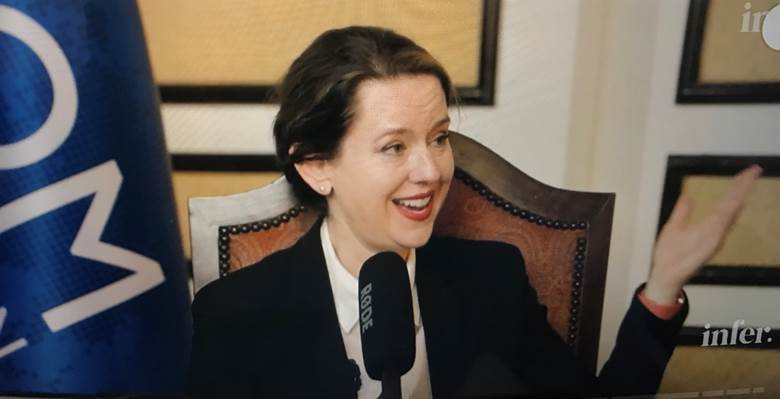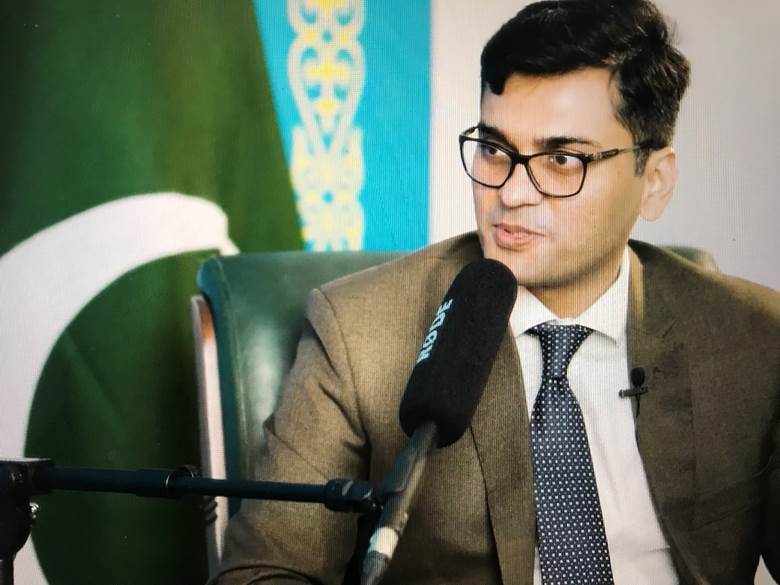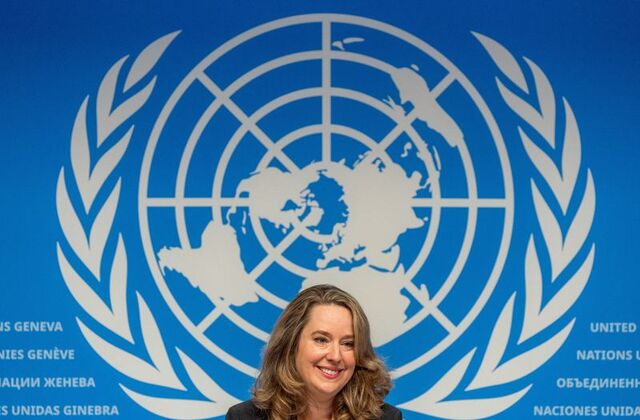

Amy Pope

Usama Nizamani
InferTalks Spotlights Migration Challenges and Opportunities in Pakistan
By Elaine Pasquini
Washington: Research journalist Usama Nizamani engaged in a discussion with Amy Pope, director general of the International Organization for Migration (IOM), on the December 22, 2023, episode of InferTalks, a digital platform offering news and insights on global issues.
As millions of people are on the move today because of conflict, climate change, and poverty, IOM, the leading organization within the United Nations system that promotes humane and orderly migration, quickly provides humanitarian assistance to the migrants. “Migration is one of the most significant issues of this moment in time,” Pope said. “We are seeing it play out across the world politically as well as in terms of the people. Our goal is to make sure that we are enabling more safe, orderly, regular migration because we know that it works for all people.”
She also pointed out that across the world there are many countries experiencing labor shortages. “Thirty of the top economies do not have enough labor this year which cost them $1.3 trillion,” she said. “So, there is this moment where we can begin to align the movement of people with opportunities which ultimately will result in better outcomes for everyone.” Pope is excited to work with Pakistan in building regular legal pathways for migration because “there is a tremendous population here within the country whose skills are needed around the world.”

Amy Pope, director general of the International Organization for Migration (IOM) attends a news conference in Geneva, Switzerland October 2, 2023. Reuters/Denis Balibouse
On this, Pope’s first visit to Pakistan, she was eager to work towards facilitating regular pathways for migration, along with anticipating, responding, and adapting to the climate crises in full view in the country.
“We know the floods here in Pakistan displaced millions of people internally and many of those people continue to be displaced,” she noted. “Pakistan is not an outlier. Last year we saw more people displaced by climate than conflict, and if you look ahead to the future, we know that will be the number one driver of human movement in the years to come. So being here and being able to understand the impact of climate change on the people of Pakistan is absolutely critical.”
IOM has provided humanitarian support to the people who were affected by floods. “It’s the kind of work we do all over the world,” she explained. “Some of it is shelter; some is psychosocial support. Some of it is hygiene kits, just to help people meet their fundamental needs. But where we want to go is to move away from just providing humanitarian support and moving toward anticipating and forecasting when communities will be displaced by climate change. The new way of looking at migration is that we don’t wait until we have millions of people displaced by floods, instead, we look at a community that is in a flood plain, and then we identify their particular vulnerabilities and whether there are ways to shore up those vulnerabilities.”
With respect to Pakistan’s “illegal foreigners repatriation plan” which allows the government to expel foreigners – many from Afghanistan – out of Pakistan, Pope pointed out that many other countries are dealing with this issue. “Ultimately countries have a right to decide who can live within its borders,” she said. “That is a sovereign right. Our hope is that when they make decisions about who can stay and who has to leave, they do so with respect for human rights. And finally, when they do determine that someone does not have status to stay in the country they do so through a legal process and that people have the opportunity to get their affairs in order and go home with dignity.”
Pope went on to relate that several good initiatives came out of the recent Cop28 UN Climate Change Conference in Dubai, including the Loss and Damage Fund which finally included funding to manage human mobility. “That’s a recognition that we actually need to use that fund in a more preventative way,” she said. “We see good examples of how the Green Fund is being mobilized. We’re looking at who are our innovative financing partners. Is it these various trust funds working with the World Bank, working with other financial institutions, and working with the private sector? Ultimately, it is in the private sector’s interest to see better migration outcomes and more stability.”
IOM is good at providing humanitarian aid in disasters, she said in conclusion. “We are excellent at quick action. Where we need to improve is in prevention and thinking ahead. We need to map out areas of high risk and make sure we have the supplies we need prepositioned so we can get them out faster. Let’s build our partnership with the private sector entities that now already have in place sophisticated systems to keep their supply chains intact even in the wake of disaster. We recently signed an agreement with Amazon to do just that. Let’s start to anticipate before the disaster happens.”
(Elaine Pasquini is a freelance journalist. Her reports appear in the Washington Report on Middle East Affairs and Nuze.Ink.)

